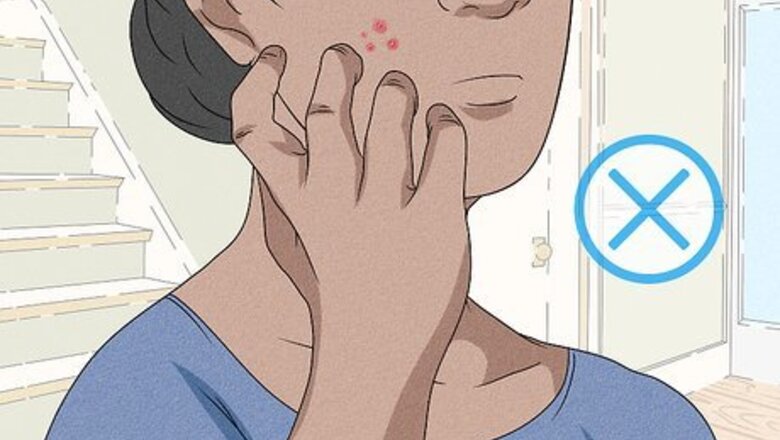
views
X
Trustworthy Source
American Academy of Dermatology
Professional organization made of over 20,000 certified dermatologists
Go to source
Soothing Itchy Skin
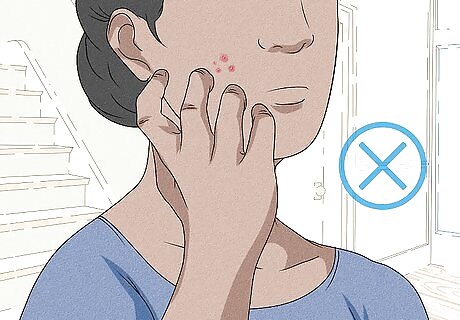
Stop scratching, even when you really want to. It may be easier said than done, but do your best to avoid scratching your acne. Touching your skin can introduce more oil, while scratching can irritate the existing acne. For a lot of people, scratching is impulsive. It may be hard to stop at first, but if you can force yourself to leave your itches alone, it will become much easier in the future. Scratching also increases the odds that you damage your skin or pop a pimple, which can lead to scarring. The reason you scratch your skin when you itch is because the slight pain from the scratch distracts your brain from the itchy sensation. If you really feel compelled to scratch, try scratching a part of your body that isn’t itchy.
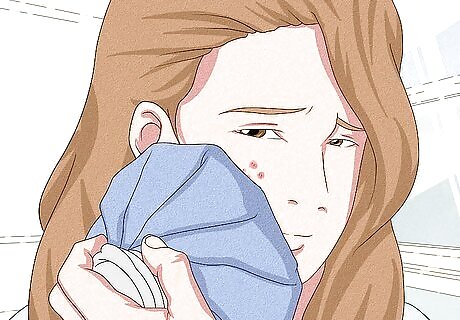
Put a cold compress on your skin to remove itchiness fast. Anything cold will help reduce the inflammation from your acne, and the numbing sensation will soothe that urge to scratch the itch. Grab an ice pack or bag of frozen vegetables and wrap it a cloth. Hold it against your skin for 5-10 minutes to stop that itchy feeling right in its tracks. The immediate sensation of something cold should put an end to the urge to scratch immediately. If you don’t have a cold compress with you, splash some cold water on your face.
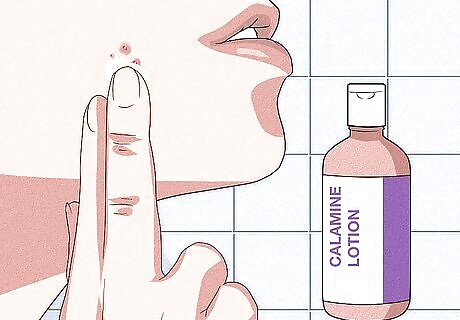
Apply calamine lotion to soothe skin while treating acne. Pick up a topical calamine lotion at your local pharmacy and apply it to your skin whenever you get the urge to scratch. Not only will the calamine give you immediate relief of the itchiness, but it will also reduce any inflammation on your skin and help your acne heal. If you’re heading out, carry a small container of calamine lotion in your pocket or purse. Dab a little on your skin whenever you need some relief. You can also try aloe vera if you want something with more cooling power than calamine, although aloe vera may not do as good a job at combatting the acne.
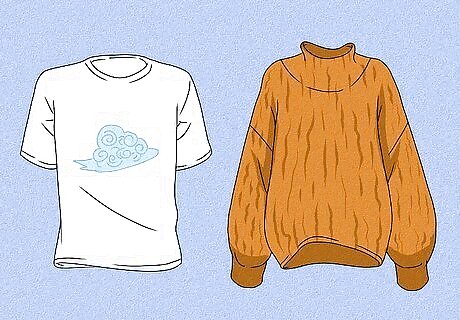
Wear loose-fitting clothing if the acne is on your body. If the acne isn’t on your face or it’s also on your back or shoulders, stay away from tight clothing. The more room you can give your skin to breathe, the less likely you are to feel the need to scratch. Opt for flowy blouses or big T-shirts instead of tighter alternatives to give your skin enough room to air out.
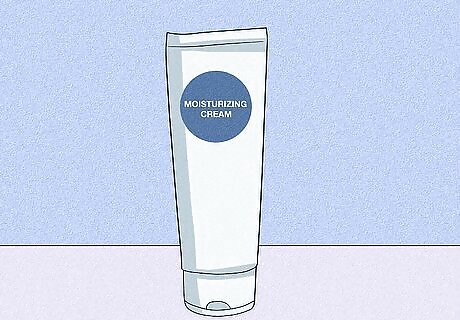
Use an oil-free moisturizer if your skin is itchy because it’s dry. Often, acne gets itchy after you’ve started treating it. Dry skin is more prone to itch, and many acne treatments fight acne by drying it out. If your skin starts to itch and it’s dry, try moisturizing your skin with an oil-free moisturizing cream. Simply work a dollop of moisturizer into your itchy acne if you feel your skin drying out. You could also use a fragrance-free, water-based emollient to get relief.
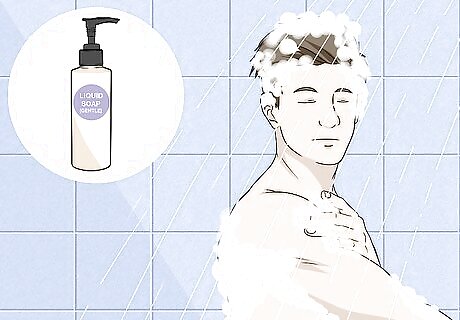
Take cooler showers and use gentle soaps and shampoos. Hot water is more likely to dry your skin out to the point of irritation, so stick to cooler showers or baths while you’re dealing with your itchy acne. Also, stay away from bar soap. Use liquid body washes or soaps that are designed specifically for sensitive skin. This will take some of the pressure off of your skin and give it time to heal. If you use a loofah, don’t scrub your skin super hard. You’re going to irritate your acne if you do this.
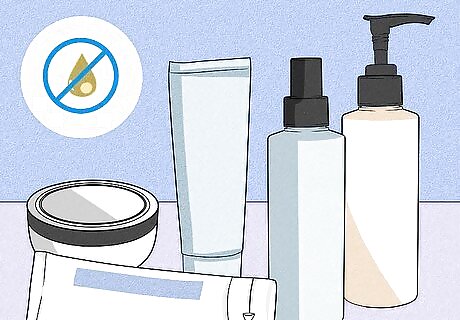
Make sure your skincare products are non-comedogenic and oil-free. Any skincare product with a lot of oil in it is likely to lead to more acne, so avoid any moisturizers or creams that list oil in its ingredients list. Also, stay away from comedogenic products, which are likely to clog up pores and keep your acne from healing. There’s a long list of ingredients that are comedogenic, so just look for skincare products that have “non-comedogenic” and “oil-free” on the label.
Treating the Acne
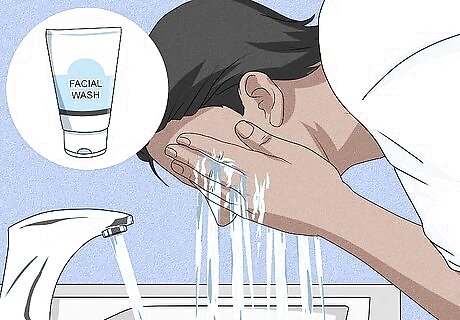
Cleanse your facial skin once in the morning and once at night. Pick up a mild skin cleanser at your local pharmacy. Get your face damp and work the cleanser into your facial skin by hand. Once you’ve worked the cleanser into your skin, rinse it off with cool water. Do this every morning after you wake up and every night before you go to bed to give your skin time to heal. This will remove any excess oil from your skin. Excess oil is typically a major culprit when it comes to acne, so getting oily skin under control is essential. If your skin tends to dry out a lot during the day and that’s when the acne gets itchy, moisturize your face after you’ve used your cleanser. Don't be too aggressive when you wash your skin since you could damage it.
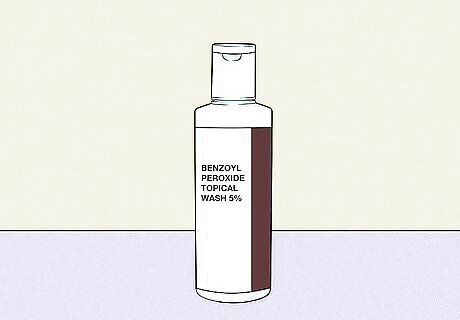
Use a benzoyl peroxide gel or face wash to fight bacteria. Go to a pharmacy and look for a 5% benzoyl peroxide skin treatment if you want to cull the germs on your skin to help the acne heal. To use it, wash your skin with a mild cleanser and water before drying it thoroughly. Put a thin layer of benzoyl peroxide gel over your skin. If it’s a face wash, rinse it off. Your skin should start to clear up after 4 weeks of daily treatment. Popular brands of benzoyl peroxide include Clean & Clear, Neutrogena, and Clearasil. This treatment option can dry your skin out. You may want to accompany this method with an oil-free moisturizer if your skin is getting itchy while it dries.
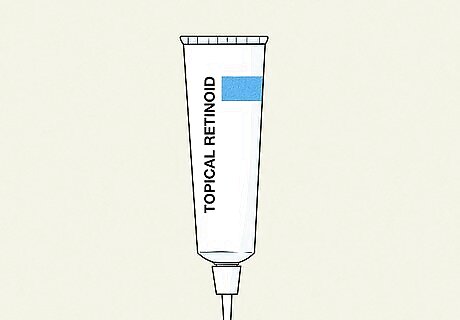
Opt for a topical retinoid to exfoliate your skin and heal acne. Retinoids work by purging dead cells from your skin, which will help your acne heal over time. Pick up a retinoid-based gel or cream and apply it to your skin 20 minutes after washing your face before you go to bed. Your acne should start clear up after 6 weeks of treatment. Differin is the most popular retinoid treatment. Do not use retinoids while you’re pregnant, since there’s a risk that they can cause birth defects. Retinol is the same thing as retinoid. The only difference is that retinol tends to be weaker.
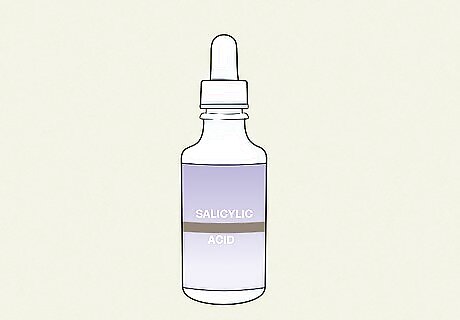
Go for salicylic acid to clean your skin gently and prevent breakouts. Salicylic acid will breakdown irritants in the pores of your skin. It’s a particularly good option if you want something a little softer that won’t irritate your skin. The other benefit is that salicylic acid tends to prevent future breakouts. Pick up a salicylic acid-based gel and apply it directly to your acne by following the directions on the package. Typology, Effaclar, and Paula’s Choice are all popular brand names for salicylic acid treatments. Your skin may sting a little bit after you apply the acid, but it may be a good thing if your acne is itchy.
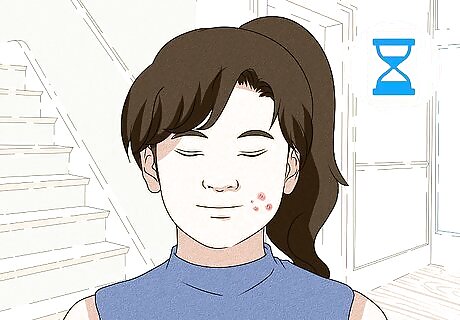
Lay off of any face masks and makeup for a bit. One of the best ways to treat acne is to simply leave it alone and let your skin do its own thing for a while. Skip any skin treatments that aren’t explicitly designed to fight acne, and avoid the beauty masks and facials for a while. Take it easy on the makeup if you wear any, since excess makeup can cause your acne to get worse. If you are going to use makeup, stick with powder makeup and skip the creams.
Seeing a Doctor
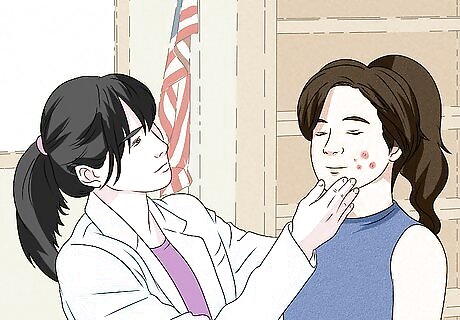
See a doctor if your acne won’t go away after 6-8 weeks. If you’ve been actively taking it easy on your skin and you’ve been treating your acne, it should get better on its own. However, if your acne isn’t clearing up or your itchiness is getting painful, go see your primary care doctor or dermatologist. They’ll be able to take a look at your skin and prescribe you something stronger for your acne. if you’ve been using OTC treatments to curb your itchy acne and it doesn’t get a little better after 6-8 weeks, it’s a sign you need the prescription-strength stuff. Itchiness isn’t always a side effect of acne. It’s possible that your itchy pimples aren’t even acne at all, although you’ll need to see a doctor to get a formal diagnosis.
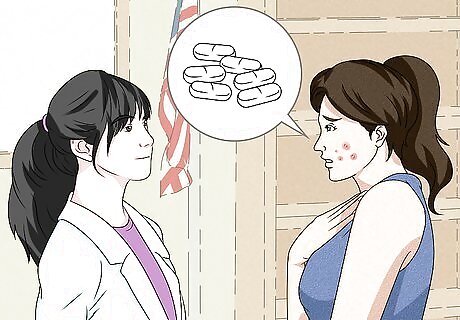
Ask about antibiotics or corticosteroids to clear your skin up. If your acne is severe enough, your doctor or dermatologist may be able to prescribe you antibiotics to reduce swelling and redness. If your skin irritated and itchy, this is a great option. They may also be able to prescribe a corticosteroid cream, which will help your inflamed skin as well. Your doctor may suggest prescription-strength retinoids to treat your acne. Unfortunately, extreme itchiness is a common side effect of retinoid-based treatments, so this may not be the best option for you.
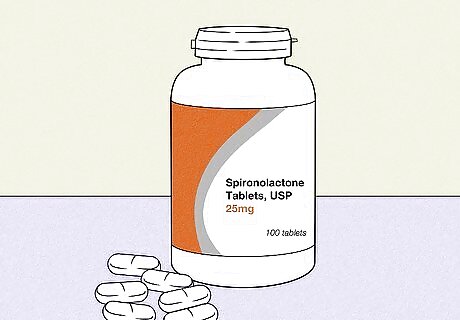
Look into spironolactone or birth control if you’re a woman. For women, spironolactone is one of the most effective treatments for acne because it balances out the hormones that cause your oily skin. Birth control functions a similar way, and it may be a great option if you’ve also been meaning to start taking birth control anyway. Talk to your doctor to figure out if these options are right for you. Spironolactone decreases testosterone production, so it’s rarely used to treat acne in men.











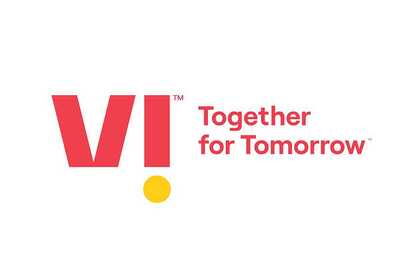



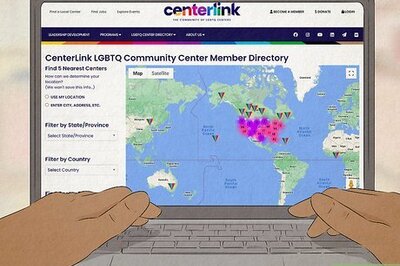



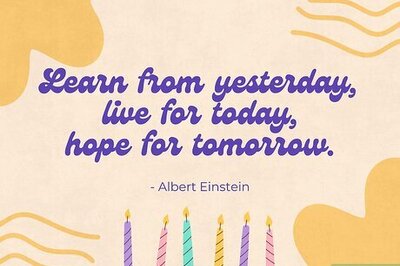
Comments
0 comment